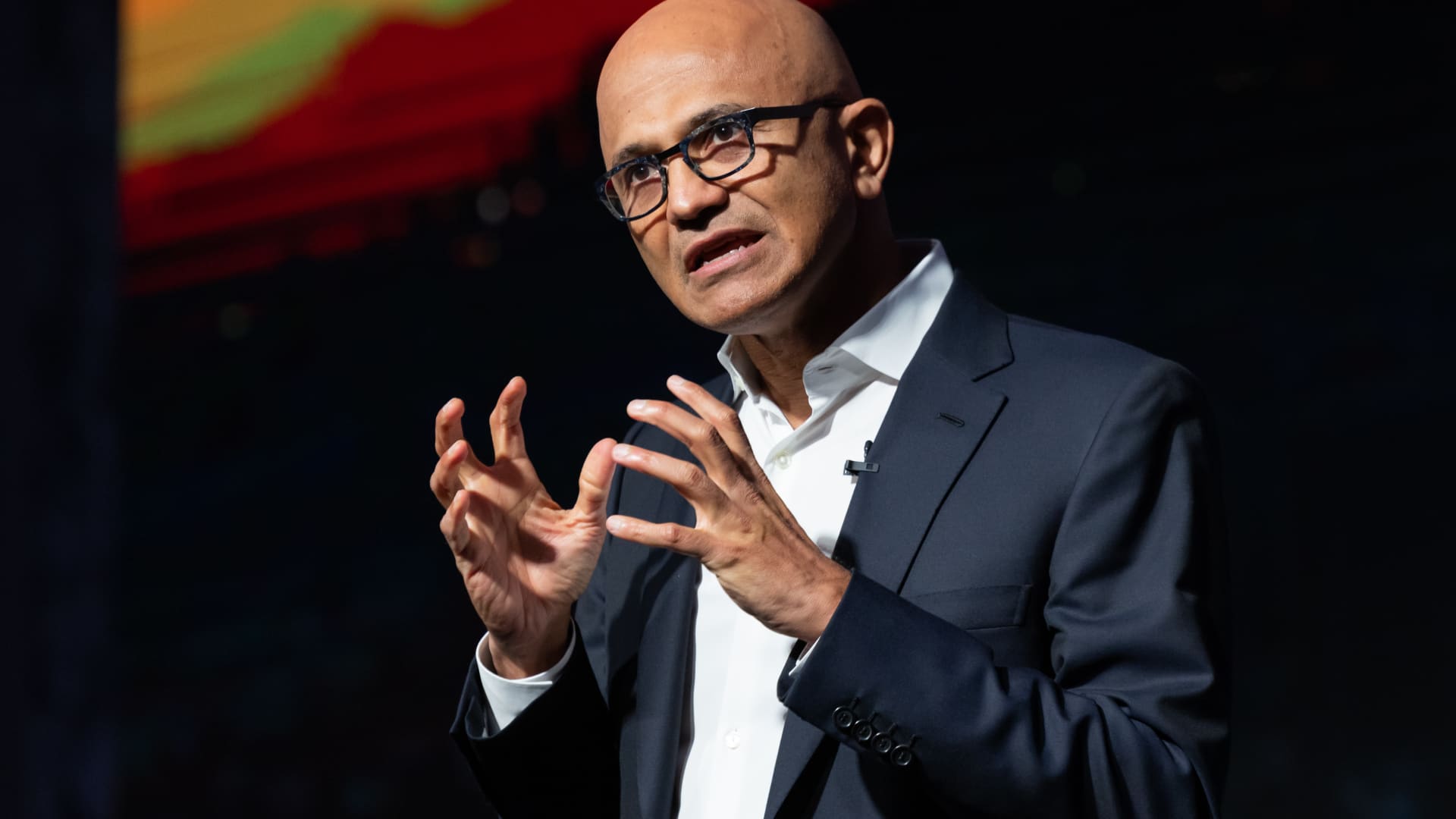

Microsoft shares slipped 1% in extended trading on Tuesday after the software maker issued fiscal fourth quarter earnings.
Here’s how the company did:
- Earnings: $2.69 per share, vs. $2.55 per share as expected by Refinitiv.
- Revenue: $56.19 billion, vs. $55.47 billion as expected by Refinitiv.
Revenue rose 8% year over year in the quarter, which ended on June 30, according to a statement. Growth has come in under 10% for three consecutive quarters for the first time since 2017. Net income totaled $20.08 billion, compared with $16.74 billion in the year-ago quarter.
Microsoft’s Intelligent Cloud segment contributed $23.99 billion in revenue, up 15% and above the $23.79 billion consensus of analysts surveyed by StreetAccount. The unit comprises the Azure public cloud, SQL Server, Windows Server, Visual Studio, Nuance, GitHub and enterprise services.
Azure revenue grew 26% during the quarter, compared with 27% growth in the previous quarter. Analysts polled by CNBC and by StreetAccount had expected 25% growth from Azure, which competes with Amazon Web Services and Google Cloud Platform. Microsoft doesn’t report Azure revenue in dollars. Google parent Alphabet said Tuesday that revenue from its cloud products, which includes Google Workspace productivity apps in addition to Google Cloud Platform, increased by 28%.
Prompted by concerns about a worsening economy, organizations using cloud services from Microsoft, Amazon and Google have taken time to adjust their existing workloads to reduce costs in the past several months. At the same time, these three prominent U.S. cloud providers have trimmed their own expenses.
For the first time since 2016, Microsoft’s research and development costs declined year over year. In May Microsoft CEO Satya Nadella told employees that the company won’t lift salaries this year. On July 10 Nadella issued a memo about a fresh round of job cuts separate from the round of layoffs affecting 10,000 workers that kicked off in January.
Microsoft’s Productivity and Business Processes segment that contains Office productivity software, LinkedIn and Dynamics delivered $18.29 billion in revenue, up 10% and more than the StreetAccount consensus of $18.06 billion.
The company’s More Personal Computing business, which contains the Windows operating system, devices, gaming and search advertising, posted $13.91 billion in revenue. That figure indicates a decline of about 4%, yet it still topped the $13.58 billion StreetAccount consensus.
Sales of Windows licenses to device makers decreased by 12%. Consumers and companies rushed to buy PCs after the onset of Covid, making comparisons difficult for the past year. Technology industry researcher Gartner estimated that PC shipments, including Apple’s MacBooks, fell about 17% during the quarter.
Microsoft and Alphabet kicked off earnings season for the mega-cap tech companies. Investors will be looking at the big tech companies for updates on cost-cutting measures implemented earlier in the year and the impact of artificial intelligence investments on profitability. Alphabet on Tuesday surpassed estimates, lifting the stock in after-hours trading. Meta reports results on Wednesday, followed by Amazon and Apple next week.
Investors are eager for resolution in Microsoft’s arrangement to buy Activision Blizzard for almost $69 billion, which was agreed upon in January 2022. Earlier this month, an appeals court denied the Federal Trade Commission’s motion to stop the transaction. Activision shares have climbed past $92.50, close to the $95 that Microsoft agreed to pay, reflecting optimism that the deal is on track to close.
The company said its operating expenses rose about 2% in the quarter, partly because of a charge to pay a fine from Ireland’s Data Protection Commission after the authority looked at whether the company’s LinkedIn unit violated the European Union’s General Data Protection Regulation.
During the quarter, Microsoft built on its broad alliance with OpenAI to capitalize on fresh interest in artificial intelligence, following the November launch of the startup’s ChatGPT chatbot. Microsoft introduced a chatbot powered partly by OpenAI language models to help workers make sense of their employers’ data, and it told developers they’ll be able to build plugins that people can access through ChatGPT, the Bing search engine’s chatbot, and other tools.
Excluding the after-hours move, Microsoft shares have gained 46% year to date, while the S&P 500 is up 19%.
Executives will discuss the results with analysts and issue guidance on a conference call starting at 5:30 p.m. ET.
This is breaking news. Please check back for updates.
— CNBC’s Todd Haselton contributed to this report.




